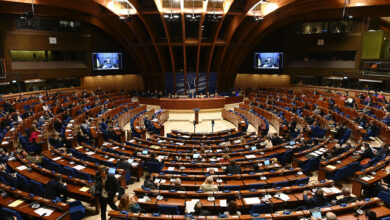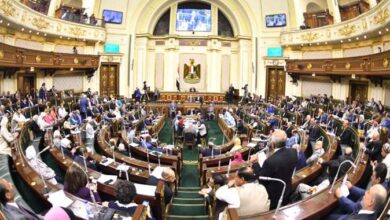A freedom of expression expert recommended 10 principles to guide the formation of Egypt’s freedom of expression laws at a conference at the American University of Cairo Wednesday.
Timothy Garton Ash, a professor of EuropeanStudies in the University of Oxford and founder of the website freespeechdebate.com, presented the draft principles for global free expression, devised as part of an Oxford research project.
The principles, developed by an international team of academics, lawyers and journalists, implore citizens to respect each other as human beings, and defend freedom of information exchange by the Internet.
Written as pledges for citizens, the principles focus on the basic human right to freely express opinion.
“We respect the believer but not necessarily the content of the belief,” says one of the pledges.
Ash said that list was devised for what the group saw as a global need, made more urgent by the proliferation of the Internet and communication technology. And the principles, he said, are especially crucial for Egypt right now.
“Tahrir Square gave a golden opportunity for people of different classes to express their opinions freely,” said Khaled Fahmy, History Department chair at the university and moderator.
These principles are intended to guide people all over the world in their roles as citizens, internet users, and human beings, Ash said.
Egyptian contributors had different theories and opinions regarding freedom of expression.
“It is very hard to set limits for freedom, but it is vital to set principles that would shape this freedom in civility and morality,” said Nora Younis, a protester and activist on the discussion panel.
She cited the writings of political activist Ahmed Gharbiah who, on the subject of government classification of people based on religion, wrote: “ I don’t care if the person sitting next to me in the public bus believes in the divine powers of a carrot. This is a human being who has the right to believe and to be respected.”
“The old regime prohibited democracy using media censorship,” said blogger and human rights researcher Amr Gharbeia, also on the discussion panel. He added that there needed to be laws limiting the right of the government to controlling the Internet, and that any laws should be enforced on all sectors of society, from regular citizens to the highest government officials.
Blogger Amr Ezzat, another panelist, said that country should strive to implement an unlimited freedom of expression law. He cited the unfairness of several cases of Egyptians who have been detained for their writings, including that of Maikel Nabil, a blogger accused of insulting the military, who was released in January after being held for 10 months and tried in a military court.
“I don’t agree with their personal views, yet I can’t find a proper reason for sending them to jail,” Ezzat said.
After audience members expressed disagreement with Ezzat’s view, citing that expression limits protect minorities and prevent hate speech, Ezzat responded, saying that any laws limiting expression will only be used to sweep societal problems under the rug, rather than addressing them openly.
“People need to express their opinions continuously, weather in a good or bad manner,” he said.
Fahmy said he disagreed with Ezzat’s view on unlimited freedom of expression, saying limits protect privacy and national security.
Freedom of expression, severely stifled under Mubarak’s rule, has emerged as an issue of great political importance during Egypt’s interim period, but political powers disagree on how speech should be limited under law.
Islamic parties, a dominant force in the country’s new parliament, have said Egypt’s future laws should place boundaries on expression if it disparages or disrespects religion. The ruling Supreme Council of Armed Forces has also prosecuted activists and protesters who have criticized its actions since it took power of the country in February 2011.



